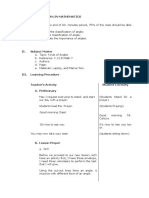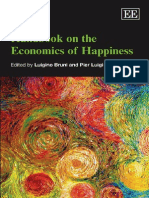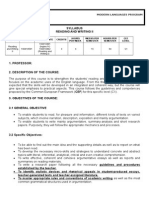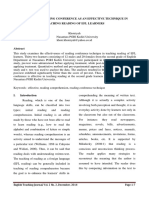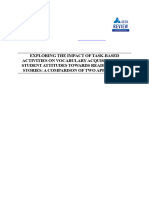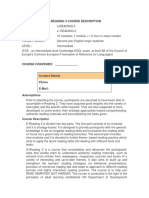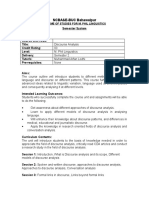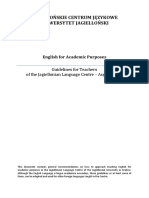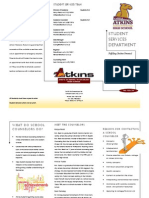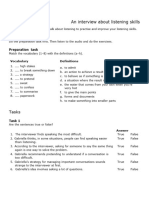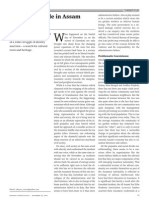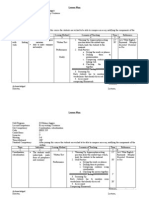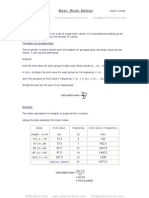Silabus Reading V
Silabus Reading V
Uploaded by
Andi AsrifanCopyright:
Available Formats
Silabus Reading V
Silabus Reading V
Uploaded by
Andi AsrifanCopyright
Available Formats
Share this document
Did you find this document useful?
Is this content inappropriate?
Copyright:
Available Formats
Silabus Reading V
Silabus Reading V
Uploaded by
Andi AsrifanCopyright:
Available Formats
UNIVERSITAS NEGERI YOGYAKARTA FAKULTAS BAHASA DAN SENI
SILABUS MATA KULIAH : READING V
FRM/FBS/19-00 Revisi : 00 31 Juli 2008 Hal.
Faculty : Language and Art Study Program : English Education Subject & Code : READING V Code ENG 213 Number of Credit : Theory 1 SKS Practice : 1 SKS Semester : 5 (five) Pre-requisite Subject & Code : Lecturer : Anita Triastuti, M.A. I. COURSE DESCRIPTION
As the continuation of the reading skills building developed in Reading IV (e.g. getting general and specific information from the text, getting the main ideas and detailed information from the text, deducing the meaning of words, phrases and sentences based on the context, and explaining relations between parts of the text through grammatical cohesive devices, and developing the skills of inferencing, analyzing, and synthesizing, and speed reading, evaluating texts or reading critically, understanding both printed and electronic reading resources, both extracts and full-scale texts of general and specific topics, understanding specialized texts such as brief, self-contained texts commonly used in TOEFL reading tests, summarizing and evaluating texts), Reading V focuses on an interactive approach to reading that engages the students to critical and extensive reading activities for developing critical thinking skills. This approach includes aspects of both intensive and extensive reading, which enables the students to develop their independent reading ability by means of authentic and full-scale texts of various disciplines while exercising particular aspects of critical reading strategies. In so doing, the students are encouraged to freely contribute in the selection of reading texts and to actively participate in classroom activities to develop critical reading requiring critical thinking skills.
II. STANDARD OF COMPETENCE
Upon the completion of the course, the students are expected to: (1) have gained vocabulary mastery of approximately 10.000 words and knowledge of grammatical structures, text organization, and cultural understanding required to comprehend various types of texts (2) acquire a good comprehension of various reading texts and of critical reading strategies (3) apply the skills and strategies for developing and enhancing critical reading and thinking skills (4) respond to various texts and participate in critical reading activities
UNIVERSITAS NEGERI YOGYAKARTA FAKULTAS BAHASA DAN SENI
SILABUS MATA KULIAH : READING V
FRM/FBS/19-00 Revisi : 00 31 Juli 2008 Hal.
III. TEACHING-LEARNING STRATEGIES
In an intensive reading session, classroom activities generally follow the pattern of prereading, while-reading and post-reading activities. The lecturer plays the role of a facilitator, enabling the students to maximize the use of their prior knowledge to understand and discuss texts at hand. To make learning more meaningful, the discussion should be related as far as possible to the students experiences, interests, values, and future. In independent reading-related sessions, which constitute the major part of the course, individuals and groups present topics they have been assigned, followed by discussions. In the case of internet-based reading resources and activities, some of the tasks and feedback will be conducted through internet.
IV. COURSE PROGRESSION
Session 1 2
Topics Introduction to the course Vocabulary Building
Sub Topics -
References/ Sources
4 5
6 7
Class Orientation Strategies for building a powerful vocabulary - Learning new words from your reading - Inferring meaning from context - Word parts - Collocations Comprehension Skills: Reading Exercises Understanding Paragraphs & Patterns of Organization Comprehension Skills: Reading Exercises Skimming & Previewing Comprehension Skills: Reading Exercises Previewing Long Material: The Parts of a Book Comprehension Skills: Reading Exercises Making Inferences Comprehension Skills: Reading Exercises Drawing Conclusions & Predicting Outcomes Comprehension Skills: Reading Exercises
UNIVERSITAS NEGERI YOGYAKARTA FAKULTAS BAHASA DAN SENI
SILABUS MATA KULIAH : READING V
FRM/FBS/19-00 Revisi : 00 31 Juli 2008 Hal.
9 10 11 12 13
14 15
16
Generalizing Mid-Semester Test Comprehension Skills: Study Reading Comprehension Skills: Summarizing Critical Reading Critical Reading: Evaluating Ideas: Fact & Opinion Critical Reading: Evaluating Ideas: Evidence Critical Reading: Evaluating Ideas: The Writers Technique (Style, Tone, Mood, Purpose, Point of View) Review & Reflection
Reading Exercises Reading Exercises Reading Exercises Reading Exercises
Reading Exercises Reading Exercises
UNIVERSITAS NEGERI YOGYAKARTA FAKULTAS BAHASA DAN SENI
SILABUS MATA KULIAH : READING V
FRM/FBS/19-00 Revisi : 00 31 Juli 2008 Hal.
IV. REFERENCES
Various articles, journals Day, Richard R. (2004). Extensive Reading Activities for Teaching Language. Cambridge, UK: Cambridge University Press Dean, Michael. (2002). Test Your Reading. Harlow, England: Pearson Education Limited Mikulecky, Beatrice S. and Jeffries, Linda. (2007). Advanced: Reading Power, New York: Pearson Education, Inc. Scull, Sharon. (1987). Critical Reading and Writing for Advanced ESL Students. Englewood Cliffs, New Jersey: Prentice Hall, Inc. Wiener, Harvey S. and Charles Bazerman. (1988). Reading Skills Handbook. Boston: Houghton Mifflin Company
V. ASSESSMENT
The final assessment is primarily based on how well students follow and internalize the process in class. Taking into account are students participation or active contribution in all of the activities, and the accomplishment of all assignments given. In overall, the assessment of the students performance is based on the following points: (1) Attendance and classroom participation 10% (2) Oral presentation 15% (3) Written reports 15% (4) Internet-based task completion 15% (5) Mid-semester 20% (6) Final Test 25%
You might also like
- Detailed Lesson Plan in Mathematics Kinds of AnglesDocument9 pagesDetailed Lesson Plan in Mathematics Kinds of AnglesDAICY CULTURA100% (5)
- Bruni - Porta - Ed - 2007 - Handbook On The Economics of HappinessDocument635 pagesBruni - Porta - Ed - 2007 - Handbook On The Economics of HappinessTedy Crestin100% (2)
- Teaching Reading and WritingDocument10 pagesTeaching Reading and WritingImelda Arreglo-Agripa100% (1)
- Module 1 AssignmentDocument5 pagesModule 1 Assignmentapi-295546221No ratings yet
- Teaching Listening and Speaking 1stDocument5 pagesTeaching Listening and Speaking 1stAlassfar AbdelNo ratings yet
- Reading and Writing V - Revisado Enero de 2015 - JDocument5 pagesReading and Writing V - Revisado Enero de 2015 - JjacqueNo ratings yet
- Curriculum Specifiications Cristina BaronDocument26 pagesCurriculum Specifiications Cristina BaronCristina Baron PeñaNo ratings yet
- Poetryunit 2-24final PDFDocument129 pagesPoetryunit 2-24final PDFRobert Robinson100% (1)
- Syllabus - Theories of Language Teaching and Learning - October 2014Document11 pagesSyllabus - Theories of Language Teaching and Learning - October 2014Anna Nguyễn0% (1)
- ENG 4U Outline 2010Document4 pagesENG 4U Outline 2010Danika BarkerNo ratings yet
- READING CLOSELY FOR TEXTUAL DETAILS - G12-Life-Steps-Almost-StraightDocument35 pagesREADING CLOSELY FOR TEXTUAL DETAILS - G12-Life-Steps-Almost-StraightNada OudahNo ratings yet
- Cambridge Delta Module 3 Assignment EAPDocument35 pagesCambridge Delta Module 3 Assignment EAPSisi YaoNo ratings yet
- Chou Literature Circles For Graded ReadersDocument21 pagesChou Literature Circles For Graded Readersradina anggunNo ratings yet
- Promoting Reading Conference As An Effective Technique in Teaching Reading of Efl LearnersDocument7 pagesPromoting Reading Conference As An Effective Technique in Teaching Reading of Efl LearnersJeaneme Anito ChuNo ratings yet
- Literature Circles in Efl Curricula Establishing A FrameworkDocument11 pagesLiterature Circles in Efl Curricula Establishing A FrameworkemysamehNo ratings yet
- Extensive Reading Module/Course Title Student Workload Credits Semester Frequency DurationDocument3 pagesExtensive Reading Module/Course Title Student Workload Credits Semester Frequency DurationBella YaNo ratings yet
- 10.2478_seeur-2023-0008Document18 pages10.2478_seeur-2023-0008tuana gönülNo ratings yet
- Research - Muhajir AnshoryDocument9 pagesResearch - Muhajir Anshory29 Muhajir AnshoryNo ratings yet
- Using Survey, Question, Read, Recite and Review (Sq3r) To Improving Reading ComprehansionsDocument35 pagesUsing Survey, Question, Read, Recite and Review (Sq3r) To Improving Reading ComprehansionsUlfie GhiezaNo ratings yet
- Dissertat DiiDocument41 pagesDissertat DiiДиана АмановаNo ratings yet
- E-Reading Course DescriptionDocument7 pagesE-Reading Course DescriptionSdndcnsck SdjcnscnskNo ratings yet
- Ew 101Document2 pagesEw 101inasrullahmalikNo ratings yet
- Jonathan M. Newton_ Dana R. Ferris_ Christine C.M. Goh_ William Grabe_ Fredricka L. Stoller_ Larry Vandergrift - Teaching English to Second Language Learners in Academic Contexts_ Reading, Writing, LiDocument319 pagesJonathan M. Newton_ Dana R. Ferris_ Christine C.M. Goh_ William Grabe_ Fredricka L. Stoller_ Larry Vandergrift - Teaching English to Second Language Learners in Academic Contexts_ Reading, Writing, LiKougryston71No ratings yet
- Sap Reading 1Document2 pagesSap Reading 1Thurma Mayasari100% (1)
- 0a6cc6e66500 PDFDocument13 pages0a6cc6e66500 PDFKritika RamchurnNo ratings yet
- Factors Affecting EFL College Students' Reading ComprehensionDocument15 pagesFactors Affecting EFL College Students' Reading ComprehensionAhmad Mujib50% (2)
- 9690 28743 1 PBDocument7 pages9690 28743 1 PBjuni artha simanjuntakNo ratings yet
- 1st DayDocument10 pages1st Dayphuongnhb.tdip024No ratings yet
- cb66 PDFDocument8 pagescb66 PDFEndeshaw YazachewNo ratings yet
- Theories of Language Learning & Teaching (Rev1)Document10 pagesTheories of Language Learning & Teaching (Rev1)Huy Nguyễn0% (1)
- Textbook Evaluation - Appropriateness of Content To Learners (Aspect 2)Document16 pagesTextbook Evaluation - Appropriateness of Content To Learners (Aspect 2)Henry OsborneNo ratings yet
- English for Academic PurposeDocument4 pagesEnglish for Academic Purposediyabaral89No ratings yet
- ENG4U1 SyllabusDocument6 pagesENG4U1 Syllabusmichaelgrabham0% (1)
- Combining - Intensive - and - Extensive - Reading - Strategies (Loucky ND) PDFDocument21 pagesCombining - Intensive - and - Extensive - Reading - Strategies (Loucky ND) PDFJung JongsuNo ratings yet
- Jonathan M. Newton and Dana R. Ferris - Teaching English to Second Language Learners in Academic Contexts_ Reading, Writing, Listening, and Speaking (ESL & Applied Linguistics Professional Series) (2018, Routledge.pdfDocument23 pagesJonathan M. Newton and Dana R. Ferris - Teaching English to Second Language Learners in Academic Contexts_ Reading, Writing, Listening, and Speaking (ESL & Applied Linguistics Professional Series) (2018, Routledge.pdfوئام زروق0% (1)
- ENG 3402-001 - Methods of Teaching Literature in Seconday SchoolsDocument10 pagesENG 3402-001 - Methods of Teaching Literature in Seconday SchoolsRuxandra OnofrasNo ratings yet
- EDCL 101 201 Reading Writing Across The Curriculum Course OutlineDocument5 pagesEDCL 101 201 Reading Writing Across The Curriculum Course OutlineKai BrightNo ratings yet
- Course Outline Discourse Analysis NCBADocument2 pagesCourse Outline Discourse Analysis NCBAMuhammad Mohkam Ud DinNo ratings yet
- Tutorial Letter 501/0/2020: Applied English Language For Foundation and Intermediate Phase - First Additional LanguageDocument161 pagesTutorial Letter 501/0/2020: Applied English Language For Foundation and Intermediate Phase - First Additional LanguageClintoncleezy matlalaNo ratings yet
- 002 Hosseini Delta3 EAP 0610Document35 pages002 Hosseini Delta3 EAP 0610Irfan ÇakmakNo ratings yet
- Expository Writing (Compulsory Course ADP (23-25) & BS (23-27) 2nd SemesterDocument3 pagesExpository Writing (Compulsory Course ADP (23-25) & BS (23-27) 2nd Semestertarteelakhan151No ratings yet
- Reading and WritingDocument15 pagesReading and WritingShalom Boker TovNo ratings yet
- Critical Journal Review Contextual Oral Language SkillsDocument16 pagesCritical Journal Review Contextual Oral Language SkillsNurul FazirahNo ratings yet
- ProposalDocument24 pagesProposalSyehab Oemar'zNo ratings yet
- English For Academic Purposes: January 2017Document33 pagesEnglish For Academic Purposes: January 2017Cey BarrackNo ratings yet
- TAM - Module 3Document16 pagesTAM - Module 3Mhel Ryan FloresNo ratings yet
- Eap 2009Document34 pagesEap 2009CZ Ling100% (1)
- Esp Reporting CompleteDocument17 pagesEsp Reporting CompleteRobert LaluNo ratings yet
- Eg 5793 Integrated Literacy 4-8 Spring2015Document11 pagesEg 5793 Integrated Literacy 4-8 Spring2015api-222054654No ratings yet
- B-Ed Annual SystemDocument43 pagesB-Ed Annual SystemRabia Sajjad50% (2)
- Submitted As A Partial Fulfillment of The Requirements For Thesis ProposalDocument22 pagesSubmitted As A Partial Fulfillment of The Requirements For Thesis ProposalKurni WatiNo ratings yet
- AP 11 Syllabus Final DraftDocument19 pagesAP 11 Syllabus Final DraftAnonymous Azxx3Kp9No ratings yet
- Course Content Pathway Nursing Track Spring 2023 - Website 1 - 105925Document9 pagesCourse Content Pathway Nursing Track Spring 2023 - Website 1 - 105925otoideflourishNo ratings yet
- The Selfie GenerationDocument2 pagesThe Selfie GenerationshkendijetahirajNo ratings yet
- Considerations For Teaching An ESL or EFL Writing Course Report OutlineDocument12 pagesConsiderations For Teaching An ESL or EFL Writing Course Report OutlineCristian PaderesNo ratings yet
- Intensive Reading in TeflDocument15 pagesIntensive Reading in TeflGregory TumeNo ratings yet
- TA10 SGV EbookDocument224 pagesTA10 SGV EbookChu MỹNo ratings yet
- Course Outline SLADocument4 pagesCourse Outline SLAv0071vmgNo ratings yet
- Heritage University Undergraduate Syllabus: "Knowledge Brings Us Together"Document19 pagesHeritage University Undergraduate Syllabus: "Knowledge Brings Us Together"Angela Bernardes JohnsonNo ratings yet
- Proposal SkripsiDocument27 pagesProposal SkripsiryanambritaNo ratings yet
- Revised Reading II ModuleDocument50 pagesRevised Reading II Modulebizuayehu702No ratings yet
- Teaching Languages to Students with Specific Learning DifferencesFrom EverandTeaching Languages to Students with Specific Learning DifferencesNo ratings yet
- The Importance of Developing Reading for Improved Writing Skills in the Literature on Adult Student's LearningFrom EverandThe Importance of Developing Reading for Improved Writing Skills in the Literature on Adult Student's LearningNo ratings yet
- SPSS SapriDocument6 pagesSPSS SapriAndi AsrifanNo ratings yet
- Elements of CultureDocument2 pagesElements of CultureAndi Asrifan100% (1)
- Elements of CultureDocument2 pagesElements of CultureAndi Asrifan100% (1)
- Pattern of First Language AcquisitionDocument11 pagesPattern of First Language AcquisitionAndi AsrifanNo ratings yet
- Sinipsis Buku Academic Writing For Graduate StudentsDocument3 pagesSinipsis Buku Academic Writing For Graduate StudentsAndi AsrifanNo ratings yet
- Differences Between Written and SpokenDocument3 pagesDifferences Between Written and SpokenAndi AsrifanNo ratings yet
- Pattern of First Language AcquisitionDocument11 pagesPattern of First Language AcquisitionAndi AsrifanNo ratings yet
- 400 Essential Words in TOEFLDocument23 pages400 Essential Words in TOEFLAndi AsrifanNo ratings yet
- Atkins Informed Consent Brochure 1 1Document2 pagesAtkins Informed Consent Brochure 1 1api-253782185No ratings yet
- An Interview About Listening SkillsDocument3 pagesAn Interview About Listening Skillsajrinaamir2604No ratings yet
- Mam Mae ObservationDocument5 pagesMam Mae Observationnelissa solina100% (1)
- Vidler TransparencyDocument2 pagesVidler TransparencyDenis JoelsonsNo ratings yet
- RRR Math 2022Document4 pagesRRR Math 2022Shehryar Aslam - 80050/TCHR/BATDNo ratings yet
- List of Program Learning Outcomes (Plos) BS: Dietetics ConcentrationDocument12 pagesList of Program Learning Outcomes (Plos) BS: Dietetics ConcentrationSaepul Adnand AfgandiNo ratings yet
- Assignment 2 Front SheetDocument21 pagesAssignment 2 Front SheetDang Tan Tai [BTEC HCM]No ratings yet
- Criteria For Judging Tally SheetsDocument14 pagesCriteria For Judging Tally SheetsMaria Angela AlveaNo ratings yet
- Adivasi Struggle in AsamDocument4 pagesAdivasi Struggle in Asamjdchandrapal4980No ratings yet
- Lesson Plan: Able To Compose Narration Able To Make Summary and AnalyzeDocument5 pagesLesson Plan: Able To Compose Narration Able To Make Summary and Analyzeabdul_muhid07No ratings yet
- Green Computing Case Study Part 3Document2 pagesGreen Computing Case Study Part 3Roman -No ratings yet
- MBA Project Report of Indira Gandhi National Open UniversityDocument4 pagesMBA Project Report of Indira Gandhi National Open UniversityPrakashB144No ratings yet
- Epp 6 Ict and Entrepreneurship First Periodical Test Table of SpecificationsDocument3 pagesEpp 6 Ict and Entrepreneurship First Periodical Test Table of SpecificationsQueennie Mae LegadaNo ratings yet
- Perancangan Pabrik Fenol Dari Kumen UMSDocument10 pagesPerancangan Pabrik Fenol Dari Kumen UMSndraNo ratings yet
- Wolfram - Alpha Activity - Topic, Polynomial Functions - Intermediate Algebra Activity 4Document4 pagesWolfram - Alpha Activity - Topic, Polynomial Functions - Intermediate Algebra Activity 4Pearson Math StatsNo ratings yet
- Chapter 7 Describing Learning ContextsDocument16 pagesChapter 7 Describing Learning ContextsKhaztandi IbrahimNo ratings yet
- CERENO ThesisProposal Chapter1Document11 pagesCERENO ThesisProposal Chapter1Sha CereNo ratings yet
- Eced 3102 - Bendebel - Namc Montessori Digital Lesson PlanDocument3 pagesEced 3102 - Bendebel - Namc Montessori Digital Lesson PlanStephany BendebelNo ratings yet
- Journey As A LibrarianDocument2 pagesJourney As A LibrarianKritika SinghNo ratings yet
- IIIT SriCity Recruitment Asst ProfessorDocument6 pagesIIIT SriCity Recruitment Asst ProfessorMohan KrishnaNo ratings yet
- Development An Overview PDFDocument20 pagesDevelopment An Overview PDFMvssp AgniNo ratings yet
- Zizek On Violence and Stories We Tell OurselvesDocument1 pageZizek On Violence and Stories We Tell OurselvesTristan LaingNo ratings yet
- Importance of TeachingDocument44 pagesImportance of TeachingEllyza CanonasoNo ratings yet
- BPE 111 - 0505 NewDocument17 pagesBPE 111 - 0505 NewEric Pascual IndieNo ratings yet
- Mean, Mode, Median & Range, Information Handling Revision Notes From GCSE Maths TutorDocument4 pagesMean, Mode, Median & Range, Information Handling Revision Notes From GCSE Maths Tutorgcsemathstutor100% (1)
- Ec2 QP 510011Document10 pagesEc2 QP 510011microdotcdmNo ratings yet
- Sslessonplan 3Document5 pagesSslessonplan 3api-280067112No ratings yet
